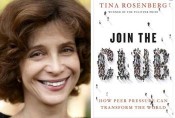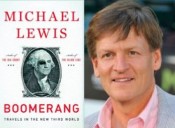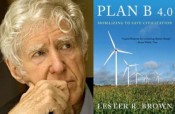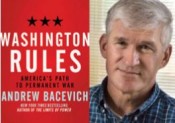Free Forum Q&A – TINA ROSENBERG: Fixes column at nytimes.com JOIN THE CLUB How Peer Pressure Can Transform the World
Written on July 24th, 2015
Originally aired July 2011
If you want to change people’s behavior – get them to use condoms, stop smoking, eat more healthy foods, for example – how do you do it? Though the examples may be contemporary, the question is old as society itself. What have we tried? Carrots – gold stars, awards, recognition, money, religious rewards…And sticks – guilt, shame, ostracism, punishment – both on earth and in the hereafter. So what works?
In her book JOIN THE CLUB, TINA ROSENBERG identifies a successful strategy based on harnessing the positive force of peer pressure. She tells stories of how it has reduced AIDS among teens in South Africa and smoking among teens in the United States, made villages in India healthier and more prosperous, helped minority students get top grades in college calculus, and even led to the fall of Slobodan Milosevic. Creative social entrepreneurs are starting to use peer pressure to accomplish goals as personal as losing weight and as global as fighting terrorism.
If you’re committed to changing behavior – from your own diet or habits to societal responses to climate change or inequity – join the club.
http://opinionator.blogs.nytimes.com/author/tina-rosenberg/?_r=0
Free Forum Q&A – MICHAEL LEWIS MONEYBALL; THE BIG SHORT; THE BLIND SIDE BOOMERANG: Travels in the New Third World includes a profile of Greece post-global crash
Written on July 16th, 2015
Originally aired October 2011
As the two countries play a high stakes game of chicken, it’s a good time to see what Greece and Germany looked like in the aftermath of the global crash. Who better to be our tour guide than best-selling author MICHAEL LEWIS?
Lewis’s book, BOOMERANG: Travels in the New Third World is made up of articles originally published in Vanity Fair and picks up where 2010’s THE BIG SHORT left off. Governments are the focus of this book. Mostly because they have taken on the bad debts of the too-big-to-fail banks, so now they are themselves at risk. Now politics and culture become much more important as to how they will deal with that risk. The book also profiles Ireland, Iceland, and California.
Both Ira Glass and Malcolm Gladwell say today’s guest is their favorite storyteller. In his books and magazine articles, Lewis writes about sports, business, Wall Street, Silicon Valley, political campaigns, fatherhood. Stuff that matters to a lot of people. He’s smart and he has a sense of humor. Once a trader at Salomon Brothers, he wrote his first best-seller, LIAR’S POKER about the excesses of Wall Street during the 1980s. He continues to write about that world with his last two books, a column for Bloomberg, and articles in Vanity Fair. We also talk about the twisted path taken to get MONEYBALL into movie theatres.
Free Forum Q&A – LESTER BROWN, Founder of Worldwatch and Earth Policy Institute author of PLAN B 4.0: Mobilizing to Save Civilization
Written on July 9th, 2015
Originally Aired October 2009
We are in a race between tipping points in natural and political systems.
Which will come first? Can we mobilize the political will to phase out coal-fired power plants before the melting of the Greenland ice sheet becomes irreversible? Can we halt deforestation in the Amazon basin before the forest becomes vulnerable to fire and is destroyed? Can we cut carbon emissions fast enough to save the Himalayan glaciers that feed the major rivers of Asia? Can we win this race?
LESTER BROWN thinks we can…
In his book, PLAN B 4.0: MOBILIZING TO SAVE CIVILIZATION, BROWN lays out the symptoms, the diagnosis, and the cure. He estimates that we could solve all the world’s greatest problems for $200B a year – less than half the US defense budget.
PLAN B 4.0 is a comprehensive plan for reversing the trends that are undermining our future. Its four overriding goals are to stabilize climate, stabilize population, eradicate poverty, and restore the earth’s damaged ecosystems. Failure to reach any one of these goals will likely mean failure to reach the others as well.It’s time for Plan B: an all-out response at wartime speed proportionate to the magnitude of the threats facing civilization.
http://www.earth-policy.org/about_epi/C32
Free Forum Q&A – RANDY HAYES, ED of Foundation Earth former head of Rainforest Action Network Now working to “ecologize” the economy
Written on July 2nd, 2015
Originally Aired November 2012
RANDY HAYES, described in the Wall Street Journal as “an environmental pit bull,” is a veteran of many high-visibility corporate accountability campaigns and has advocated for the rights of Indigenous peoples. These days the primary work of the founder of RAINFOREST ACTION NETWORK and current Executive Director of FOUNDATION EARTH is rethinking and “ecologizing” the economy.
According to Hayes, “The most important environmental or human rights policy is economic policy. That means changing the very basis of the failed system that created the problem. We need a deep green economy – not a green-washing economy. We must ecologize the economy…To start, we must help under-consumers (the malnourished and wanting) move up to a sustainable level of consumption while we assist over-consumers (the wasteful and indifferent) down. We must protect the remnants of wild nature and allow for damaged land, water, and sky to heal.”
http://www.fdnearth.org/staff-2/
Free Forum Q&A – ANDREW BACEVICH U.S. Army, Colonel, Ret.(after 23 years) who lost his son in Iraq WASHINGTON RULES: America’s Path to Permanent War
Written on June 26th, 2015
Originally Aired August 2010
President Obama’s recent decision to add an additional 450 American soldiers to our 3,000 strong train-and-equip mission in Iraq made me reach for a dose of ANDREW BACEVICH, a voice of sanity on issues of war and peace. Bacevich wrote of Obama’s move in an op-ed, Washington in Wonderland: Down the Iraq Rabbit Hole (Again).
In WASHINGTON RULES, the 2010 book we talk about in this interview, Bacevich (in his own words) “..aims to take stock of conventional wisdom in its most influential and enduring form, namely the package of assumptions, habits, and precepts that have defined the tradition of statecraft to which the United States has adhered since the end of World War II — the era of global dominance now drawing to a close. This postwar tradition combines two components, each one so deeply embedded in the American collective consciousness as to have all but disappeared from view.
The first component specifies norms according to which the international order ought to work and charges the United States with responsibility for enforcing those norms. Call this the American Credo — …to lead, save, liberate, and ultimately transform the world.
…With regard to means, that tradition has emphasized activism over example, hard power over soft, and coercion (often styled ‘negotiating from a position of strength”) over suasion. Above all, the exercise of global leadership as prescribed by the credo obliges the United States to maintain military capabilities staggeringly in excess of those required by self-defense.”





